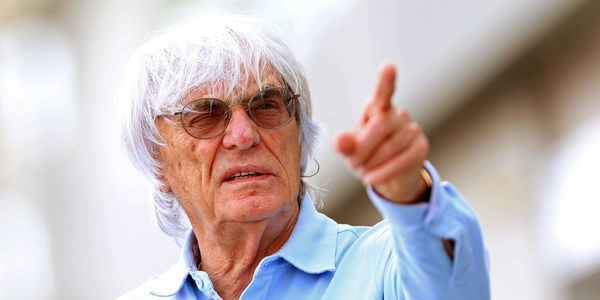
via Getty
SINGAPORE – SEPTEMBER 19: F1 Supremo Bernie Ecclestone walks in the paddock during previews for the Singapore Formula One Grand Prix at Marina Bay Street Circuit on September 19, 2013 in Singapore, Singapore. (Photo by Mark Thompson/Getty Images)

via Getty
SINGAPORE – SEPTEMBER 19: F1 Supremo Bernie Ecclestone walks in the paddock during previews for the Singapore Formula One Grand Prix at Marina Bay Street Circuit on September 19, 2013 in Singapore, Singapore. (Photo by Mark Thompson/Getty Images)
Last night, my editor messaged me and broke the news to me ‘Ecclestone has retired man, he’s out’, finally confirming the month long speculation that the incoming American owners wanted to break away the norm.
The octogenarian has been at the helm for long, too long, and F1 is what it is particularly because he shaped it so and allowed it to be shaped so.
But in Bernie Ecclestone the sport has not only lost a ringmaster but also a scapegoat.
Yes, Bernie has been the guy to point your finger at when anything has gone wrong with the sport. As the post-Ecclestone era arrives, the teams will no longer be able to imply that all of the sport’s ills are caused by his obstructions, or by his ongoing mini-battles with the sport’s other stakeholders. At some point the teams will have to recognize when they themselves are often the source of obstruction and find a way of prioritizing the long-term needs of the sport over their individual short-term interests.
ADVERTISEMENT
Article continues below this ad
Such is his legacy and his fans rightly feel so. The current Concorde Agreement that has vastly disrupted the sport’s revenues can be squarely put at his feet, but he has to be credited to taking the sport towards a unified direction when the warring variables i.e. the teams were so diverse in their outlook that they all wanted to run in different directions.
And we probably wouldn’t be even arguing about F1 at all had he not been there. Ecclestone was instrumental in saving the sport in the 1970s and making it the international business powerhouse it is today.

via Reuters
Formula One supremo Bernie Ecclestone speaks to the media at the paddock area ahead of the Russian F1 Grand Prix in Sochi, Russia, October 9, 2015. REUTERS/Maxim Shemetov/Files
As a young man, Bernie Ecclestone would become a seller of motorcycle parts after the 2nd World War and eventually wade into the sale of cars while plying his skills as a racer in the early 50’s.
While success on the track was moderate, Ecclestone reckoned managing drivers might be an opportunity and while he tried a few more races himself, it was eventual team ownership that ensconced Ecclestone in the world of Formula1.
Ecclestone bought the Brabham F1 team in 1971 From there, he became involved in FOCA.
Before Ecclestone, F1 teams had little to no interests in managing the overall structure of the sport rather than just arriving at the races and trying to win. With no unison amongst them, the big guys (Ferrari, Renault and Alfa Romeo) ruled the Sport with the FISA (a branch of FIA) heavily inclined towards them.
Bernie assumed the leadership of the Union of the minnows and went to loggerheads with FISA and FIA and after years of the now famous FISA-FOCA war, it finally resulted in agreements between the two bodies which gave a structure to the sport itself while heralding an era of continuous development in all aspect of the sport.
ADVERTISEMENT
Article continues below this ad
FOCA, which was led by the team principals of non-manufacturer teams Brabham, Lotus, March, McLaren, Williams and Tyrrell, eventually let Ecclestone start negotiating broadcast rights for the sport.

via Reuters
Formula One supremo Bernie Ecclestone walks in the Mercedes team garage during the third practice session of the Canadian F1 Grand Prix at the Circuit Gilles Villeneuve in Montreal June 6, 2015. REUTERS/Chris Wattie
What anyone born after the 1985 may not be aware of is just why Ecclestone is so core to the DNA of F1. The simplest way to describe his investment and risk in F1 is to recognise that he, and no one else, was chosen to lead the teams through the control of the sport from a very bombastic regulatory body led by a very bombastic Frenchman name Jean-Marie Balestre. When teams were asked to underwrite the races as circuit owners weren’t willing, it was Ecclestone who fronted the cash to make it happen. When F1 faced a daunting global economic crisis, he moved F1 to emerging markets ripe with cash in order to the keep the series insulated from economic austerity.
ADVERTISEMENT
Article continues below this ad
He was Formula One’s, as Thomas Paine described, necessary evil. A dictatorial figure to watch over the sport and tackle efficiently the hurdles that it ran into, and many a times because of the doings of the tyranny of the majority within the so called Democratic Structure of the Sport itself.
Bernie Ecclestone, the man, is far from infallibility. No man is and perhaps that is the reason the man who once saw a business opportunity in structuring the sport and exploited it to the utmost degree, failed to anticipate the next big trend and today after 40 years of being at the helm is having the door shown to him by more or less the same process through which he gained the control of it.
ADVERTISEMENT
ADVERTISEMENT
ADVERTISEMENT
ADVERTISEMENT


